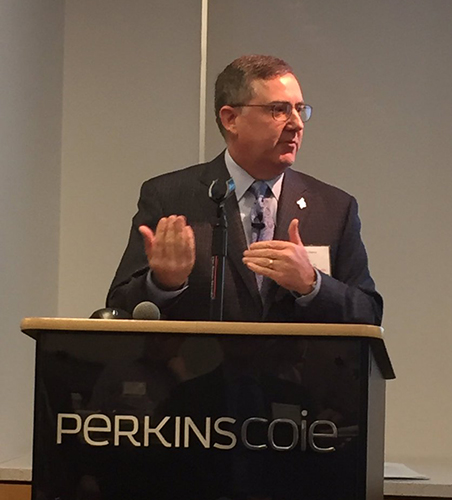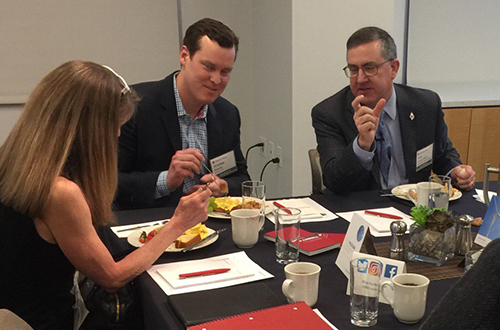 |
|
 |
Washington State University (WSU) is on a drive to become one of the nation’s top 25 public research universities under the leadership of Dr. Kirk Schulz. President Schulz became the 11th WSU president in June 2016.
WSU is known for excellence. That reputation is about to get even better. President Schulz outlined his plan to transform the university’s research and educational offerings at the CleanTech Alliance Breakfast Series event held on February 8 at Perkins Coie. Here are seven key takeaways:
1. The Drive to 25. President Schulz is committed to turning WSU into a top 25 public research university by 2030. That drive is outlined in the institution’s strategic plan, which calls out two pivotal goals:
- WSU will offer a transformative educational experience to undergraduate and graduate students.
- WSU will accelerate the development of a preeminent research portfolio.
Progress is already well underway with initiatives across improving job placement rates for recent graduates and diversifying the student body (almost a third of WSU students are from minority or underrepresented groups), faculty and staff.
2. A history in clean technology. WSU has impacted our regional clean energy and technology landscape from the very beginning. In the 1920s, Professor Homer Dana helped Grand Coulee Dam planners understand the region’s energy needs. Today, WSU addresses clean technology needs through 16 interdisciplinary, collaborative research centers and labs that work with and serve the industry sector, including:
- Renewable biofuels and bioproducts
- Smart grid
- Advanced composite and bio-based materials
- Addressing and protecting air and water quality
- Sustainable building design
- Organic and precision agriculture
3. Too many major innovations and programs to count. Cougar pride fuels incredible achievement. WSU is driving major research and innovations across a number of notable research and innovations, including:
- WSU’s power system engineering program is considered among the best in the world. The program enjoys long and deep collaboration between computer science and power engineering faculty, resulting in large-scale projects like GridStat that have advanced the state of the art in smart grid technologies.
- The Elson S. Floyd College of Medicine is off to a great start. The program received 700 top-notch applications for 60 spots. The result will create new doctors and medical professionals to serve the entire population of Washington State.
- Washington State is the second largest U.S. wine producer behind California thanks to WSU’s leading viticulture and enology program.
- WSU is ideally positioned to lead in agriculture. The university has a top precision agriculture program and one of the few universities offering a full degree for organic farming in production agriculture (going beyond the one or two classes offered by most land grant universities).
- WSU led creation of a portable biosensor that detects harmful bacteria in food and the development of new microwave technology that increases the quality and safety of packaged food.
- Scientists from the Paul G. Allen School for Global Animal Health are playing a vital role in the World Health Organization’s effort to eradicate human rabies from the planet by 2030.
4. The impact of innovation is amplified with commercialization. Washington State University is turning innovation into economic impact through its technology transfer and commercialization programs. The university is working to align disciplines to push innovations to market, teaming engineering students with business students, for example.
In 2016, WSU generated cleantech innovations across 246 sponsored research awards, 129 invention disclosures, 62 licensing agreements, 235 patent applications and seven startups launched.
5. Partnerships allow WSU to tackle key challenges and opportunities. President Schulz stressed that one university standing alone cannot solve the world’s problems. To truly lead, WSU needs to partner with other universities, national laboratories and private industry. The result will expand WSU’s economic impact across our state, our nation and our planet.
Partnerships are a major part of reaching the Drive to 25 goal. In total, WSU is partnering with more than 20 clean technology industry partners across cross-laminated timber, renewable aviation biofuels, organic farming and more. WSU is also currently working closely with the CleanTech Alliance as a Platinum Member with Michael Wolcott serving on our Board of Directors. The university also won the 2015 CleanTech Achievement Award.
6. WSU will become a global player. Growing internationally is critical for WSU to reach the top 25. President Schulz fully expects the university to become an international bridge into China and beyond. There are several international recruiting efforts currently underway. The goal is for international students to make up18% to 20% of WSU admissions. (That number is currently 7%.) As that transformation happens, President Schulz expects a lot of the partnership and innovation examples to shift to an international focus.
7. Telling the WSU story; breaking the best-kept secret moniker. President Schulz is out to remove “best-kept secret” from people’s vocabulary when describing WSU. The university cannot become a global leader if it does not share its story. Students, faculty and staff must to do a better job sharing WSU accomplishments and milestones at the regional, national and global levels.
Want to learn more? Check out the #CleanTechBacon Twitter conversation.
The CleanTech Alliance Breakfast Series is your opportunity to rub elbows with distinguished cleantech executives from across the Northwest and beyond. Sponsored by Perkins Coie, join 100 cleantech industry leaders for a monthly conversation featuring a tremendous lineup of distinguished speakers. Check out our full lineup of executive speakers!